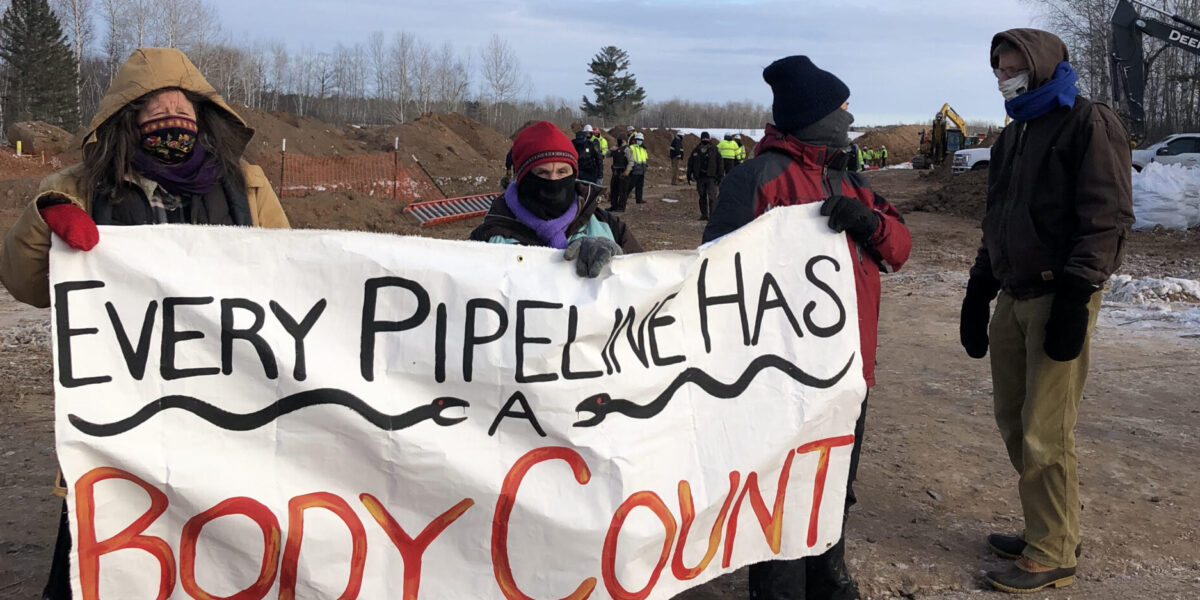The route has been clear cut, a trench has been dug, and Enbridge is now burying the pipe underground and under many major waterways. Many Native community members say they do not want to see this pipeline completed.
8-year-old Water Protector, Jagger stands on a frozen lake near her home on the Fond Du Lac Reservation, singing the Nibi Song. She and her family hope the song inspires people to protect the water.
[20 Seconds of Water Song covers the first round of words]
Simone Senogles is also an activist. She is a member of Red Lake Nation and has worked with the Bemidji-based Indigenous Environmental Network for 20 years.
“So we understand that line three is part of the fossil fuel infrastructure, right? And I think particularly for Minnesota, we are called the land of 10,000 lakes, and it’s true! You can’t go very far without running into some water. And so, having pipelines that are known to leak, are known to fail, running through water-rich land, is preposterous. It’s outrageous. Like who thought of that? Who thinks that’s a good idea?!” said Senogles.
Back in 1991, the Line 3 pipeline ruptured near Grand Rapids, spilling over 1.7 million gallons of oil into the Prairie River, which connects to the Mississippi River. The only thing that saved both rivers was the 18 inches of ice covering the Prairie River that year.
Pipeline opponents, like Senogles, are worried about another Line 3 spill but they are also concerned with Tribal treaty rights. They say construction and subsequent leaks in this pipeline would devastate hunting, fishing, wild rice harvest and that Native communities rely on these fruits of the earth to connect to their culture, and to feed their families.
“So we know this Line Three emissions are going to push us over the top of what we can come back from…this sort of predatory capitalism system that we all live under, combined with, you know, colonization, capitalism, colonization, gendered violence, racism, sexism, all of those things are connected. And so that when we fight something like line three, we have to be aware of those connections.” said Senogles.
The fear of catastrophe, along with historical disrespect of culture and treaties, has fueled some Native people to take up direct action in the form of camps.
There are 4 active camps along the new Line 3 Pipeline Corridor, with a 5th planned to launch this week.
Many Water Protectors at the camps say they are concerned with the recent police mobilization against them.
Winona LaDuke is a White Earth Tribal member and lead organizer for the camp on Great River Road north of Palisade.
Late last week, LaDuke addressed a Minnesota House public safety committee about policing concerns.
“The reason that this is a deep concern to us is because of course, Enbridge has said that they will pay for the police costs in Minnesota associated with ensuring that they are enabled to put in Line Three and attended to that there’s a lot of I believe civil rights problems that are associated with a Canadian multinational, paying the expenses of your police force in the state of Minnesota, to ensure that a project that they want to get through is able to happen. Now how that’s unrolled so far as being very problematic to us. ” sais LaDuke.
Enbridge Energy did not respond to my message asking for comment on previous oil spills in Minnesota, or for a statement about the camps.
In a recent statement, the company said “Our first priority is the safety of all involved – our workers, men and women in law enforcement, and the protesters themselves. As a company, we recognize the rights of individuals and groups to express their views legally and peacefully. We don’t tolerate illegal activities of any kind including trespassing, vandalism, or other mischief, and Enbridge will seek to prosecute those individuals to the fullest extent of the law.”
Emma Needham Reporting for Minnesota Native News


 A Gift for Uplifting Native Voices and Stories with Ramona Marozas
A Gift for Uplifting Native Voices and Stories with Ramona Marozas